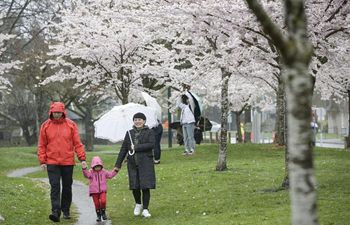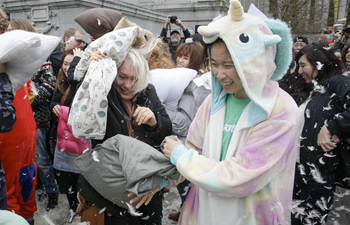LOS ANGELES, April 10 (Xinhua) -- Arctic mountain glaciers are melting faster than at any time in the past 400 years because of rising summer temperatures, a new study found.
The warmer temperatures are melting 60 times more snow from Mt. Hunter in Alaska's Denali National Park today than the amount of snow that melted during the summer before the start of the industrial period 150 years ago, according to the study, published in the latest issue of Journal of Geophysical Research: Atmospheres, a journal of the American Geophysical Union.
More snow now melts on Mt. Hunter than at any time in the past 400 years, Dominic Winski, a glaciologist at Dartmouth College in Hanover, New Hampshire and lead author of the new study, said in a news release on Tuesday.
The new study's results show the Alaska Range has been warming rapidly for at least a century. The Alaska Range is an arc of mountains in southern Alaska home to Denali, North America's highest peak.
To better understand how the climate of the Alaska Range has changed over the past several hundred years, Winski and 11 other researchers from Dartmouth College, the University of Maine and the University of New Hampshire drilled ice cores from Mt. Hunter in June 2013.
New ice cores taken from the summit of Mt. Hunter show summers there are least 1.2-2 degrees Celsius warmer than summers were during the 18th, 19th, and early 20th centuries. Hunter is about double the amount of warming that has occurred during the summer at areas at sea level in Alaska over the same time period, according to the new research.
Researchers believe that warming of the tropical Pacific Ocean has contributed to the unprecedented melting of Mt. Hunter's glaciers by altering how air moves from the tropics to the poles.
They suspect melting of mountain glaciers may accelerate faster than melting of sea level glaciers as the Arctic continues to warm.
"This adds to the growing body of research showing that changes in the tropical Pacific can manifest in changes across the globe," said Luke Trusel, a glaciologist at Rowan University in Glassboro, New Jersey who was not connected to the study. "It's adding to the growing picture that what we're seeing today is unusual."
Since mountain glaciers provide fresh water to many heavily-populated areas of the globe and can contribute to sea level rise, understanding how mountain glaciers are responding to climate change is important.
"The natural climate system has changed since the onset of the anthropogenic era," Winski said. "In the North Pacific, this means temperature and precipitation patterns are different today than they were during the preindustrial period."













